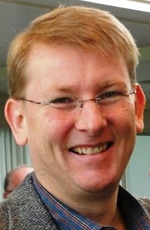Without sharing, big data is nothing

 Steve Hau (pictured at right), founder and CTO of Shareable Ink, echoed the idea that developing open data exchange was the key to unlocking big data’s potential in an August 20 interview, saying that “data liquidity,” or the ability of data to move from setting to setting without obstruction, “is the first step to get to data aggregation and then a meaningful view into population health.”
Steve Hau (pictured at right), founder and CTO of Shareable Ink, echoed the idea that developing open data exchange was the key to unlocking big data’s potential in an August 20 interview, saying that “data liquidity,” or the ability of data to move from setting to setting without obstruction, “is the first step to get to data aggregation and then a meaningful view into population health.”
Shareable Ink uses the implicit structure of clinical forms to organize written documentation recorded via digital pen or iPad. These devices send the documentation to the company’s data center where it is processed into detailed, structured patient data. That is, liquid data. “We’re essentially building and selling the picks and shovels to get to this big data gold rush”
Shareable Ink focuses on collecting highly detailed, highly structured data, not huge data sets. This choice relates to the debate surrounding big data over whether smaller, more detailed data sets yield better results than larger masses of heterogeneous, less-detailed data.
 For Kaj Pedersen (pictured at left), CTO of Pharmacy OneSource, who recently spoke with Healthcare IT News, “the debate to some degree, in my mind, is probably futile. It’s almost like people are taking positions one side or the other and what they’re not necessarily looking at in the question is what is the outcome you are trying to achieve, who are you trying to serve, and what’s the data that you need to support that?”
For Kaj Pedersen (pictured at left), CTO of Pharmacy OneSource, who recently spoke with Healthcare IT News, “the debate to some degree, in my mind, is probably futile. It’s almost like people are taking positions one side or the other and what they’re not necessarily looking at in the question is what is the outcome you are trying to achieve, who are you trying to serve, and what’s the data that you need to support that?”
Analyzing massive sets of population data may generate better general understanding of diseases, but this means doctors asking if their particular patients match the population. Landman voiced the fear that “One of the risks and one thing we may see develop over the coming years as there is a push towards big data is the idea of the loss of the actual individual patient…I don’t know anyone that can fundamentally tell you which one is better…and its ultimately, probably, going to be a balance between the two.”
Unfortunately, and perhaps frustratingly, big data poses both great risks and great benefits, the negotiation of which stand to occupy the healthcare industry for the foreseeable future. The open source network ideal seems unrealistic for now (not least because of the heightened concern over data security and privacy provoked by the NSA scandal). But this talk of balance suggests a more pragmatic approach to the issue of big data. A culture of managed expectations is a necessary step in beginning to explore the greatest benefits of big data.
“In the last years…there were pretty much just the Star Trek notions of big data, of ‘look what it could do,’” said Landman, “and now, more and more, we’re talking about specifics, EMR integrations, market players…and I think that’s fundamentally a lot more interesting”
























